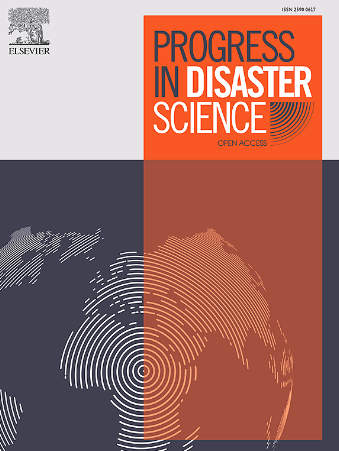A food resilience model integrating local wisdom and sociotechnical dynamic systems: Case study flood-affected communities in the Bengawan solo area
IF 3.8
Q3 ENVIRONMENTAL SCIENCES
引用次数: 0
Abstract
This study aimed to identify local potential and design a food resilience model based on local wisdom regarding floods. Floods can degrade the quality of food products. Indonesian people are known to have local wisdom on maintaining food resilience to mitigate natural disasters. This study proposes improving community preparedness for disaster threats and strengthening their capacity to respond effectively by integrating local wisdom, thereby improving food resilience and achieving disaster mitigation. To support research exploring how local wisdom can be effectively integrated into food resilience in communities affected by natural disasters, especially floods, effective strategies and methods are required to combine local wisdom with scientific and technological approaches. The sociotechnical system method and dynamic system approach were used to develop a model that can provide information to the community and government, thereby optimizing the function of local wisdom in food resilience. This study shows that local wisdom is important for flood mitigation and food resilience in communities affected by flood disasters. Based on the simulation results, the best scenario was obtained for the three regions. Governments can use these proposals to formulate policy priorities for implementation in each region.
结合当地智慧和社会技术动态系统的粮食恢复力模型:班加班solo地区受洪灾影响社区的案例研究
本研究旨在识别当地的潜力,并设计一个基于当地智慧的粮食弹性模型。洪水会降低食品的质量。众所周知,印尼人在保持食物弹性以减轻自然灾害方面具有当地智慧。本研究建议通过整合地方智慧,改善社区对灾害威胁的准备,加强其有效应对能力,从而提高粮食恢复力,实现减灾。为支持探索如何将地方智慧有效地融入受自然灾害(特别是洪水)影响社区的粮食恢复力的研究,需要将地方智慧与科学技术方法结合起来的有效战略和方法。采用社会技术系统方法和动态系统方法开发了一个模型,该模型可以为社区和政府提供信息,从而优化地方智慧在食物恢复力中的作用。这项研究表明,地方智慧对于受洪水灾害影响的社区的洪水缓解和粮食恢复能力非常重要。根据模拟结果,得到了三个区域的最佳方案。各国政府可以利用这些建议制定政策优先事项,以便在每个区域实施。
本文章由计算机程序翻译,如有差异,请以英文原文为准。
求助全文
约1分钟内获得全文
求助全文
来源期刊

Progress in Disaster Science
Social Sciences-Safety Research
CiteScore
14.60
自引率
3.20%
发文量
51
审稿时长
12 weeks
期刊介绍:
Progress in Disaster Science is a Gold Open Access journal focusing on integrating research and policy in disaster research, and publishes original research papers and invited viewpoint articles on disaster risk reduction; response; emergency management and recovery.
A key part of the Journal's Publication output will see key experts invited to assess and comment on the current trends in disaster research, as well as highlight key papers.
 求助内容:
求助内容: 应助结果提醒方式:
应助结果提醒方式:


